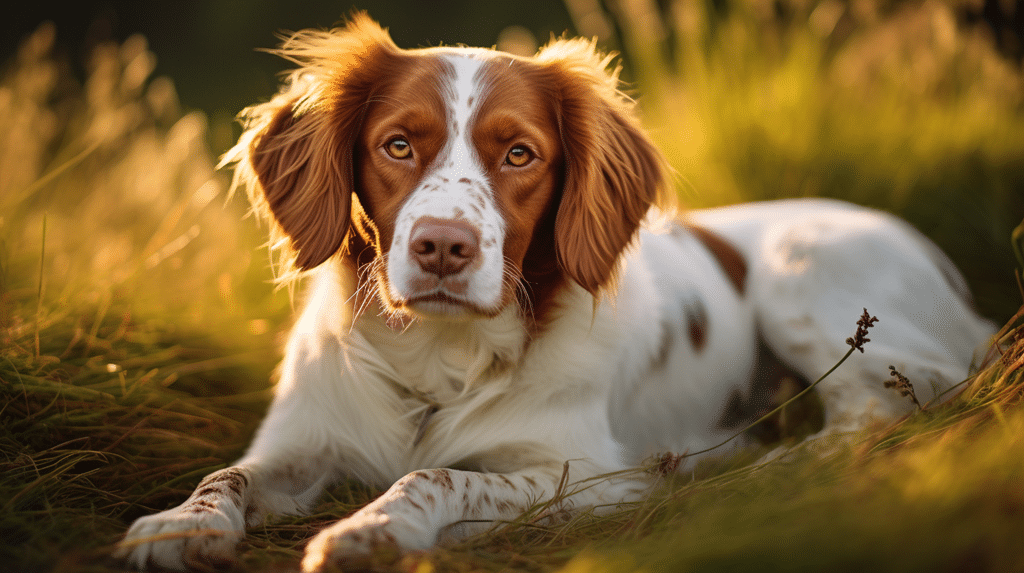Ever wondered what makes a Brittany dog tick? You’re about to delve into an insightful journey exploring the unique temperament of these energetic canines. You’ll discover how their high energy levels impact their behavior, the importance of social skills, and the patience required in training. You’ll also understand their compatibility with children and other pets, and how they cope with separation anxiety. Get ready to decode the fascinating world of Brittany dogs!
Understanding Brittany Dog Temperament
Why wouldn’t you want to know the key facets of a Brittany dog’s temperament? Understanding the temperament of a Brittany is crucial to forming a strong, harmonious bond with your furry friend. Three primary aspects of their nature are Brittany Intelligence, hunting instincts, and a protective nature.
Brittany Intelligence is one of the standout facets of this breed. They’re extremely smart, quick learners, and thrive on mental stimulation. This makes them a joy to train, but it also means they require constant mental engagement. If they’re bored, they may resort to destructive behaviors. So, it’s important to provide them with enough mental stimulation to keep them happy and content.
Their hunting instincts are another key facet. Brittanys were bred for hunting, and this instinct remains strong in the breed today. They have a strong drive to chase and fetch, making them excellent companions for active individuals or families. But remember, this hunting instinct means they may not always get along with smaller pets, so it’s something to consider if you have other animals in your house.
Lastly, their protective nature is a trait that can’t be overlooked. Brittanys are known for their loyalty and dedication to their humans. They’re protective, but not overly aggressive, making them excellent family dogs. However, this protective instinct can lead to territorial behaviors, so early socialization and training are essential.
Brittany’s Energy Levels
Don’t let the Brittany’s compact size fool you, as you’ll quickly find out they pack a lot of energy into their small frame. This breed is known for its high energy levels, and understanding Brittany’s exercise needs is crucial to ensuring they remain happy and healthy.
Brittanys are athletic dogs that require regular, vigorous exercise. They’re a sporting breed, after all, bred for hunting and retrieving game. Just a walk around the block won’t cut it for these active dogs. They need a good run, a long hike, or a vigorous game of fetch to expend that pent-up energy. Without sufficient exercise, a Brittany can become restless and may develop behavioral problems.
But it’s not just physical exercise that’s important. Brittanys are intelligent dogs that need mental stimulation too. Training exercises, agility courses, or games that require problem-solving can help keep their minds sharp.
Diet impact is another important aspect to consider. What you feed your Brittany can affect their energy levels. A balanced diet rich in proteins, carbohydrates, and healthy fats can provide the sustained energy they need for their active lifestyle. However, overfeeding can lead to weight gain, which can reduce energy levels and impact overall health.
Sleep patterns also play a role in a Brittany’s energy levels. These dogs need a good night’s sleep to recharge after a day of activity. A tired dog might seem less energetic, but that’s simply because they’re resting up for another day of fun and games.

Social Skills of Brittany Dogs
Along with their high energy levels, you’ll also find that Brittanys have exceptional social skills, making them a great addition to your family. These dogs are known for their Brittany Bonding, which refers to their deep-seated instinct to form strong bonds with their human families. This bonding is not just a result of their love for play and interaction, but a testament to their emotional intelligence and desire for companionship.
Their Playful Interactions are a joy to experience. Brittanys are:
- Not just playful, but also gentle, especially when playing with kids or smaller pets.
- They can adapt their play style, showing their understanding of their playmate’s capabilities.
- Remarkably intelligent, using their playtime not just for fun, but also for learning.
- They learn social cues, commands, and routines during play, reinforcing their training.
- Extremely friendly and sociable, they love meeting new people and dogs.
- Their friendly nature helps them make friends easily, promoting their social development.
Speaking of Social Development, Brittanys are quick learners and eager to please, which makes them highly trainable. They thrive in environments where they’re given consistent guidance and positive reinforcement. Their social skills aren’t limited to humans and canines; they’re known to get along well with other animals too.
Training Brittany Dogs: Patience Required
Transitioning from their outstanding social skills, it’s crucial to remember that training your Brittany requires a good deal of patience. These dogs are renowned for their Brittany intelligence, which makes them quick learners but also means they require consistent, stimulating training.
Their vocal tendencies can sometimes be a challenge during training sessions. Brittanys are known for their expressive nature and they may bark or vocalize when they’re frustrated or excited. Always approach training with calmness and patience, turning potentially disruptive behaviors into teachable moments.
Their hunting instincts can also complicate training. Brittanys are born hunters, with a strong instinct to chase and retrieve. This can lead to distractions during training. Therefore, it’s crucial to incorporate their hunting instincts into your training regimen. For instance, use fetch games or scent tracking exercises to tap into these instincts productively.
To help you better understand, here’s a table summarizing these key points:
| Characteristic | Challenge | Training Approach |
|---|---|---|
| Brittany Intelligence | Quick learners, require stimulation | Consistent, engaging training |
| Vocal Tendencies | Can bark or vocalize when frustrated or excited | Calm patience, use vocalization as teachable moments |
| Hunting Instincts | Strong instinct to chase and retrieve | Incorporate instinct into training with fetch games or scent tracking |
Brittany Dogs With Children and Other Pets
When you bring a Brittany into a home with children and other pets, you’ll quickly pick up on their amicable and adaptable nature. This breed thrives on companionship and they’re known for their protective instincts, particularly when it comes to their human family. They’re not just protectors, though. Brittanys are also incredibly playful, making them perfect for child-friendly activities.
However, it’s important to remember that, like all dogs, Brittanys need proper socialization to ensure they feel comfortable around children and other pets. Below are some tips to help you introduce your Brittany to new family members:
- Introducing New Pets:
- Start slow: Don’t rush the introduction process. Allow your Brittany time to adjust to the new addition.
- Keep initial interactions controlled: Use a leash or gate to prevent any potential aggression.
- Engaging in Child-Friendly Activities:
- Incorporate games: Brittanys are energetic and love to play. Games like fetch or hide-and-seek can help strengthen the bond between your child and their new pet.
- Train together: This not only teaches your Brittany obedience, but also instills a sense of responsibility in your child.
- Harnessing Brittany’s Protective Instincts:
- Provide a safe space: A crate or bed can serve as a sanctuary for your Brittany, helping them feel secure.
- Establish a routine: Regular feeding, walking, and play times can help reduce anxiety and enhance their protective nature.

Coping With Separation Anxiety in Brittanys
Despite their adaptable nature and protective instincts, you may find that your Brittany struggles with separation anxiety, a common issue in this breed. Recognizing anxiety triggers, implementing calming techniques, and practicing anxiety prevention can aid in managing this condition.
Anxiety triggers in Brittanys can include sudden changes in schedule, absence of family members, or unfamiliar environments. It’s crucial to identify what specifically triggers your dog’s anxiety to best address it.
| Anxiety Triggers | Calming Techniques | Anxiety Prevention |
|---|---|---|
| Sudden changes in schedule | Keeping a consistent routine | Gradual introduction to new routines |
| Absence of family members | Comfort items like toys or blankets | Regular socialization with different people |
| Unfamiliar environments | Use of calming scents or sounds | Frequent exposure to new places |
Calming techniques can vary based on what works best for your Brittany. Keeping a consistent routine can provide security and predictability for your dog. Using comfort items like a favorite toy or blanket can also soothe your dog in your absence. Furthermore, the use of calming scents or sounds can create a relaxing atmosphere.
Finally, anxiety prevention is a long-term strategy that involves gradual introduction to new routines, regular socialization with different people, and frequent exposure to new places. This reduces the likelihood of unfamiliar situations triggering anxiety.
Dealing with your Brittany’s separation anxiety can be challenging but understanding the triggers, employing calming techniques and focusing on prevention can significantly help in managing this condition. Remember, patience and consistency are key in helping your Brittany overcome separation anxiety.
Frequently Asked Questions
What Is the Average Lifespan of a Brittany Dog?
You’re asking about a Brittany’s lifespan. With good breeding practices, proper attention to their high activity levels, and meeting their nutritional needs, they’ll generally live between 10 to 14 years.
What Specific Health Issues Are Common in Brittany Dogs?
Brittany dogs battle genetic disorders like hip dysplasia and epilepsy. They’ve high exercise needs to keep fit. It’s crucial to follow a strict vaccination schedule to prevent common canine ailments. Be well-informed and proactive.
What Is the Origin and History of the Brittany Breed?
You’re looking into the origin of the Brittany breed. They’re known for their exceptional hunting skills, which contributed to their popularity. Brittany’s temperament is also a key factor in their history and widespread appeal.
How Much Does a Brittany Dog Typically Weigh?
Your Brittany dog’s weight depends on its feeding requirements, exercise needs, and growth stages. Typically, adults weigh between 30-40 pounds. Proper diet and activity levels are crucial to maintain a healthy weight.
What Kind of Grooming Does a Brittany Dog Require?
Your Brittany dog’s grooming isn’t a walk in the park. Regular brushing is crucial to keep tangles at bay. Don’t forget nail trimming and ear cleaning to keep your dog in tip-top shape.
Conclusion
So, you’re thinking about adopting a Brittany, eh? Well, prepare for a life filled with boundless energy, endless fetch games, and the occasional test of patience. These social butterflies will charm your socks off and play nicely with your kiddos and other pets. Just remember, they don’t like being alone, so you’ll have to learn some doggy psychology to tackle their separation anxiety. But hey, who needs free time, right?

